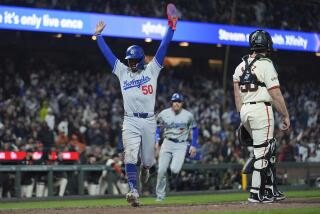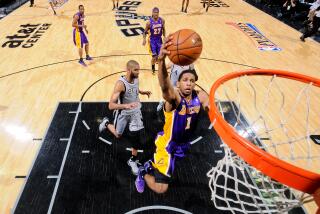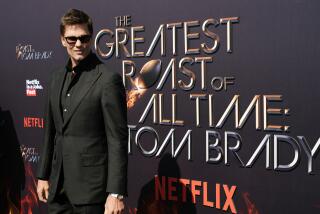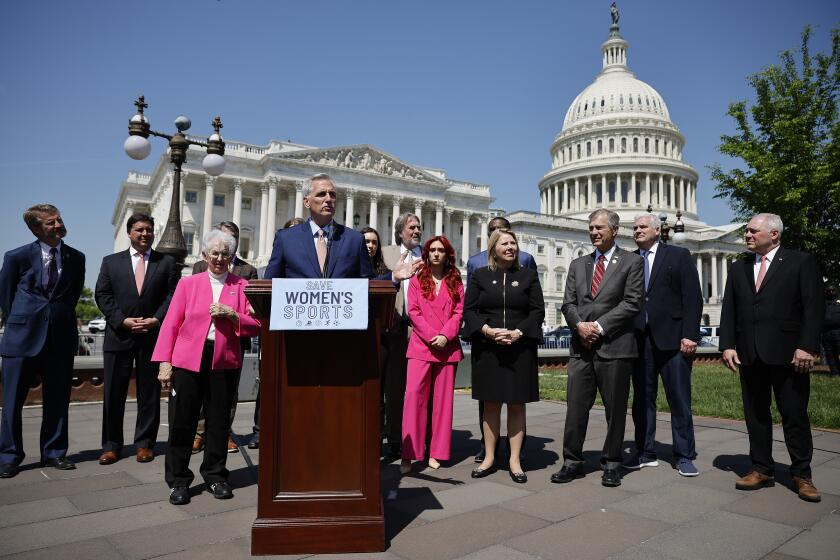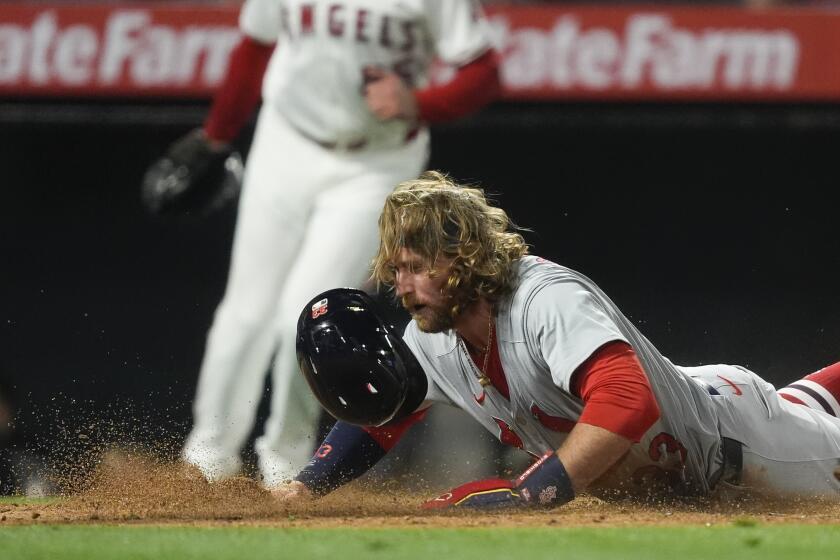Palmer Coasts to Trophy
Get that little dude into a dressing room, and quick.
Pull him out of that bulky jersey, pads and thick pants. Put him in something light, something sleek; those bronze bones aren’t used to warm Coliseum nights.
And the high-top boots? Please! This is the Pac-10, remember? You have any track cleats?
And could someone pull him out of that awful crouch? Make him stand up tall, make his eyes dance, put his hands on his hips and cock the helmet back on his head.
It’s been 21 years since the Heisman Trophy came to the West Coast, and he needs to look the part.
Oh, and one more thing.
Can you wipe that grimace off his face and give him a smile?
A dazed, loopy, I can’t-believe-some-rich-New-Yorker-just-handed-me-college-football’s- greatest-trophy smile?
It’s the kind of smile worn by the USC quarterback who is bringing him here.
His name is Carson Palmer.
And, yeah, well, I’ll be a son of a bias.
I don’t believe it either.
It was more impossible than somersaulting over Ricky Manning Jr.
It was more unusual than throwing for 425 yards against the sons of Rockne.
It was a upset bigger than Beano Cook’s belly, against competition stiffer than Lee Corso’s hair.
Carson Palmer won the 2002 Heisman Trophy on Saturday night, and nothing more outrageous has been written on these sports pages in, I don’t know, at least a month.
Since all that stuff about the Angels winning the World Series.
Carson Palmer won the Heisman, and next thing you know, they’re going to move Tuscaloosa to Tustin and trade Ann Arbor for Alhambra.
He won it even though nobody in the Eastern time zone was supposed to stay up late enough to watch his games.
He won it even though nobody in the Midwest was supposed think he was tough enough.
He won the most regionally biased award in all of sports despite being from a region that is represented by only one-sixth of the 921 voters.
That’s how hard it was.
That’s how good he was.
That’s how much USC should celebrate a coach like Pete Carroll who made him comfortable, a coordinator like Norm Chow who made him versatile, a publicity guru like Tim Tessalone who made him accessible.
And a big kid whose quiet spirit made it possible.
Think about it, all you high school swaggerers and Pop Warner preeners.
Carson Palmer drowned out thumping tubs from Iowa City to Miami without ever raising his voice.
He overshadowed Heisman highlight flicks from State College to Boulder with nothing more dramatic than two fingers pointed to the sky.
He won it with performance. He won it with winning.
Think about this.
Palmer may be the only Heisman winner in recent times who, upon scoring a touchdown, never playfully posed like the trophy.
Here’s guessing old John Heisman wouldn’t have minded.
When I saw Palmer take the stage at the Yale Club on Saturday and say, “My heart’s about to come out of my chest,” I thought about the last time I saw him look so confused.
It was the middle of November, and I approached him outside Heritage Hall to explain that I was going to begin banging the drum for his Heisman campaign.
At the time, he was an afterthought on every list, his shaky early career haunting him, his geography hiding him.
He had become clearly the hottest player in the country, with 13 touchdown passes in his last three games, but who knew, and who would know?
Sure, USC had had four Heisman winners. But that was before the 1980s emergence of college football giant ESPN, whose announcers now essentially coronate the Heisman winner, who usually comes from a team that plays on their channel.
The Pac-10 has a TV contract with Fox Sports Net, which meant Palmer was not being promoted or even shown in many Eastern time zone homes and hotels that do not receive the network.
“The Heisman?” he said to me that day, laughing. “Are you kidding me?”
Voters loved Ken Dorsey, the Miami quarterback who has lost one game in his entire career. Voters were falling hard for Brad Banks, the Iowa quarterback who led his team on a swath through the Big Ten.
Voters were thinking about Miami’s Willis McGahee, and Colorado’s Chris Brown, and Marshall’s Byron Leftwich.
Heck, Palmer wasn’t even the most respected quarterback in his own conference, that distinction belonging to Washington State’s Jason Gesser.
“Sure, I’d love to think about the Heisman,” Palmer said that day. “But I know how it works.”
So that’s what I wrote, that it would take either the elimination of all time zones or a couple of incredible final games for Palmer to get what he deserves.
At about 8 p.m. Pacific Standard Time on Nov. 30, he completed those games.
First, there were the four touchdowns and no interceptions in a pasting of UCLA that featured Palmer’s Heisman Moment. It was a somersault over Manning that looked like John Elway and inspired his team to 52 points.
“That’s something that will be shown on TV for the rest of the year,” said Carroll after that game. “That has to help.”
Then, a week later, there were all those yards with four touchdown passes against Notre Dame in what was his Heisman Closing Argument.
Remember how Palmer led the trailing Trojans on a quick touchdown drive at the end of the first half against the nation’s fifth-ranked defense?
The Notre Dame players were so demoralized, they let the Trojans race past them through the tunnel into the locker room at halftime.
Even then, the game was done. So, too, it turned out, was the Heisman race.
Palmer didn’t just win what was supposed to be the closest five-man battle in history, he won it relatively huge, with nearly 50 more first-place votes than the next guy.
Banks, the runner-up, didn’t have the numbers or the schedule.
Larry Johnson, Penn State’s third-place finisher despite rushing for more than 2,000 yards, struggled against his three toughest opponents.
McGahee, despite six touchdowns in the season finale, finished fourth probably because he was only a sophomore.
And Dorsey, the favorite entering the season, watched his mediocre personal statistics overcome his incredible team statistics.
“When I heard how all the voting broke down, I was taken aback,” Palmer said during a phone interview late Saturday. “I had no idea it would be like that.”
He had no idea about any of this. He did not try to win anything.
“I just played,” he said. “All season, I just went out there with nothing on my mind but helping the team. I just played.”
So big-time college sports can still work that way, huh?
That smile on the little bronze dude, make it a big one.
*
Bill Plaschke can be reached at bill.plaschke@latimes.com
More to Read
Get our high school sports newsletter
Prep Rally is devoted to the SoCal high school sports experience, bringing you scores, stories and a behind-the-scenes look at what makes prep sports so popular.
You may occasionally receive promotional content from the Los Angeles Times.
